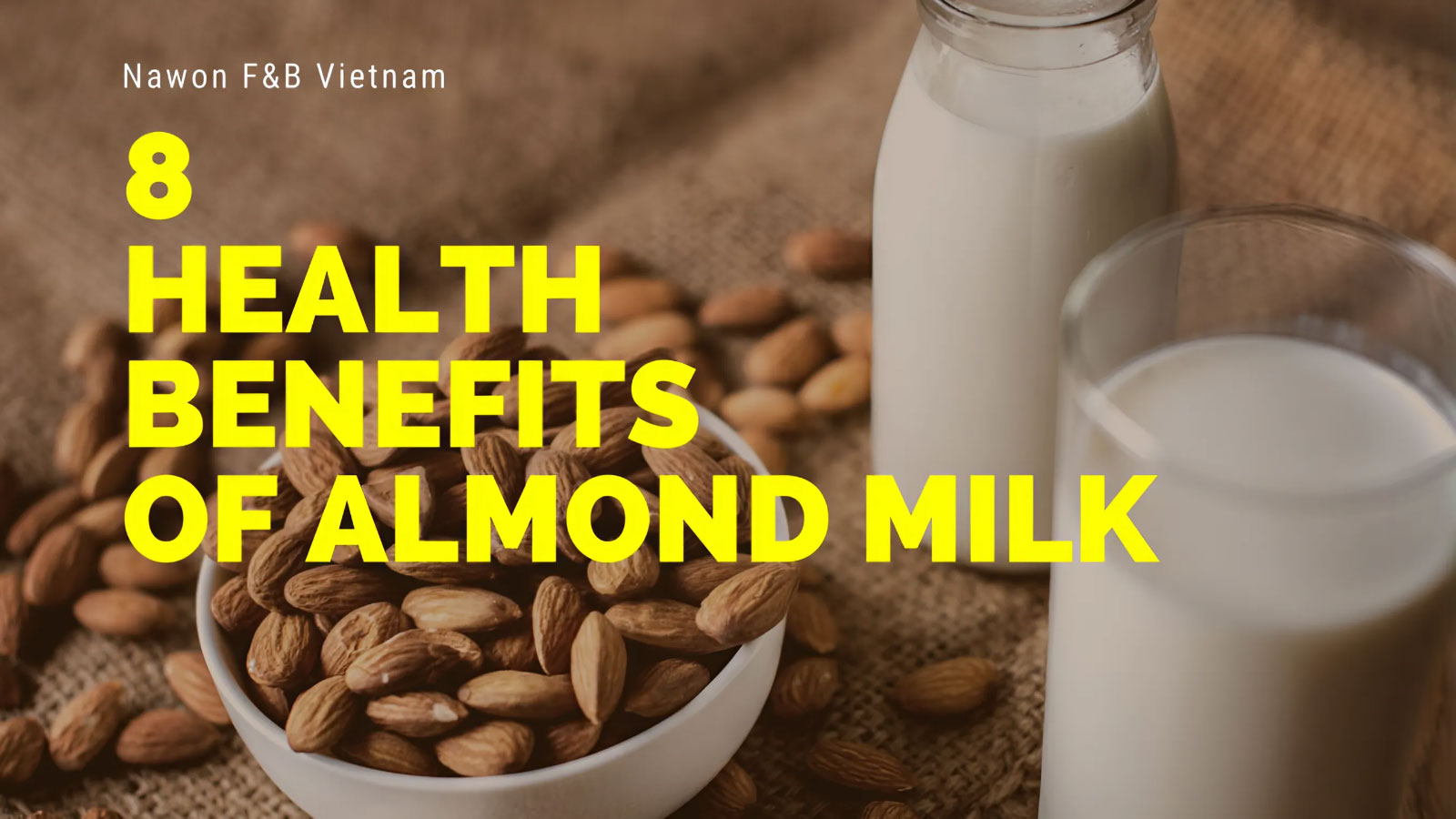Almond milk is a nutritious, low-calorie drink that is becoming very popular. Additional nutrients such as calcium, riboflavin, vitamin E and vitamin D are often added to increase nutritional content. It’s great for those who can’t or choose not to drink cow’s milk and those who like the taste. This article takes a closer look at 8 health benefits of almond milk.
8 health benefits of almond milk
Weight control
One cup (240 ml) of unsweetened almond milk contains about 30–50 calories, while the same amount of whole milk contains 146 calories. That means almond milk contains 65–80% fewer calories. If you’re trying to lose weight, replacing two or three daily servings of milk with almond milk will help reduce your daily calorie intake by up to 348 calories. Remember that unfiltered homemade versions may have more almonds left, so they may also be higher in calories, so that’s why Nawon almond milk is a good choice for you.
Suitable for people with diabetes
Unsweetened almond milk has very little sugar. One cup (240 ml) of almond milk contains only 1–2 grams of carbs, most of which are fiber. For comparison, 1 cup (240 ml) of milk contains 13 grams of carbs, mostly sugar. Therefore, almond milk is suitable for people who limit their sugar intake, such as people with diabetes. However, many varieties are sweet, so checking nutrition labels is important.

High in vitamin E
Vitamin E is a powerful antioxidant that combats inflammation and stress in the body. It helps protect against heart disease and cancer, and it may also have beneficial effects on bone and eye health. What’s more, vitamin E has been found to benefit brain health significantly. Studies have found that it improves mental performance. It also appears to reduce the risk of Alzheimer’s disease and may slow its progression.
Almonds are naturally high in vitamin E, providing 37% of the daily vitamin E requirement in just 1 ounce (28 grams). Depending on the brand, one cup of almond milk (240 ml) provides 20–50% of your daily vitamin E requirement. In comparison, dairy milk contains no vitamin E at all.
A good source of calcium
Calcium is an important mineral for the development and health of bones. It also helps reduce the risk of fractures and osteoporosis. Also, calcium is necessary to function properly in the heart, nerves, and muscles. One cup of almond milk (240 ml) provides 20–45% of the recommended daily intake for calcium.

Enriched vitamin D
Vitamin D is an important nutrient for many aspects of good health, including heart, bone, and immune function. Vitamin D deficiency is associated with an increased risk of cancer, heart disease, high blood pressure, osteoporosis, muscle weakness, fertility issues, autoimmune diseases and infectious diseases.
Most almond milk is fortified with vitamin D2, also known as ergocalciferol. On average, 1 cup (240 ml) of fortified almond milk provides 25% of the recommended daily intake for vitamin D.
Naturally lactose-free
Lactose intolerance is when people cannot digest the lactose in milk. Intolerance can cause many unpleasant symptoms, including stomach pain, bloating and gas. Since almond milk is naturally lactose-free, it is a suitable alternative for those with lactose intolerance.
Good for vegans
Almond milk is completely plant-based, making it suitable for vegetarians and those who avoid dairy products. It is also ideal for people who are allergic to milk. Because of its low protein content, it is unsuitable to replace milk in young children completely.
Low in phosphorus, with moderate amounts of potassium
People with chronic kidney disease often avoid drinking milk due to its high phosphorus and potassium content. Because their kidneys cannot properly remove these nutrients, there is a risk that they will build up in the blood. Cow’s milk contains 233 mg of phosphorus and 366 mg of potassium per cup (240 ml), while the same amount of almond milk contains only 20 mg of phosphorus and 160 mg of potassium. Therefore, almond milk may be a suitable alternative for reducing potassium and phosphorus intake due to kidney disease.

Incorporating the benefits of almond milk into your daily life
Next, we’ll explore various ways to reap the benefits of almond milk and make it a staple in your routine.
Enjoy it as a refreshing beverage
One of the simplest ways to incorporate almond milk into your daily life is by enjoying it as a refreshing beverage. Whether you prefer it chilled or at room temperature, a glass of this milk can be a satisfying and nutritious drink. You can drink it alone or add it to your morning coffee, smoothies, or tea for a creamy and slightly nutty flavor.
Use it in breakfast cereals and oatmeal
Almond milk can be a fantastic addition to your breakfast routine. Pour it over your favorite cereal or mix it into your oatmeal for a creamy and nutritious start to your day. The subtle sweetness of it adds a delightful touch to your breakfast bowl, making it a tasty and healthier alternative to cow’s milk.
Incorporate it into smoothies and shakes
Almond milk can be a valuable ingredient if you’re a fan of smoothies and shakes. Its creamy texture and mild taste make it an ideal base for delicious and nutritious concoctions. Blend it with your favorite fruits, vegetables, and protein powder to create a refreshing and fulfilling beverage packed with vitamins and minerals.

Use it in baking and cooking
Almond milk can replace dairy milk in many baking and cooking recipes, making it a versatile ingredient. It has a creamy texture and subtle nutty flavor, whether baking cakes, muffins, and cookies or cooking savory dishes like soups or sauces. Just substitute an equal amount of almond milk for dairy milk in the recipe, and you’re good to go.
Create dairy-free desserts
For those with lactose intolerance or following a dairy-free lifestyle, almond milk can be a game-changer for desserts. Use it to make dairy-free puddings, custards, ice creams, and even creamy popsicles. You can indulge in delicious treats without worrying about any digestive discomfort.
Make almond milk yogurt
If you enjoy yogurt but want a dairy-free option, try making almond milk yogurt at home. It’s a simple process that involves blending this milk with a yogurt starter culture and allowing it to ferment. The result is a creamy and tangy yogurt that can be enjoyed alone or mixed with fruits and granola.

Discover almond milk-based recipes
There are numerous recipes available that specifically highlight almond milk as a key ingredient. From creamy soups and pasta sauces to dairy-free Alfredo or mac and cheese, you can explore a new world of flavors and textures using it. Get creative in the kitchen and experiment with different recipes to find your favorites.
The health benefits of almond milk provide many great health benefits while also making it a great alternative to cow’s milk. Regardless of age, almond milk is a safe solution to provide essential nutrients. Make this seed milk a versatile and delicious addition to your daily routine to experience the incredible health benefits of milk now.

